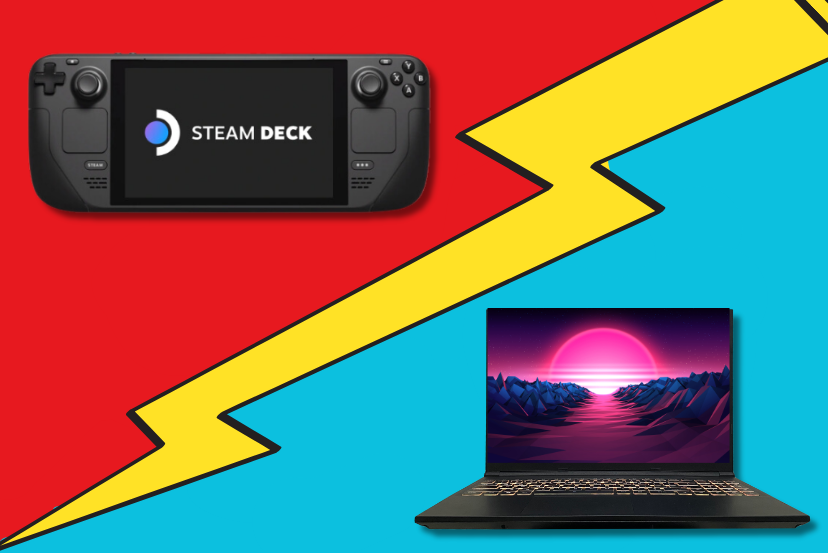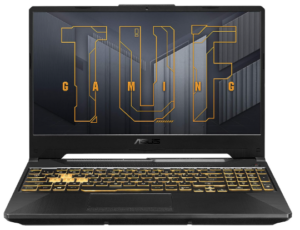Steam Deck vs Gaming Laptop: Who Wins?

Steam Deck vs Gaming Laptop: A Comprehensive Guide for Every Gamer
As a gamer, your pursuit for the optimum gaming experience often finds you at a crossroads. One road leads you towards a compact, handheld device like the Steam Deck, while the other ushers you towards a versatile, power-packed Gaming Laptop. Choosing between the two might seem like an impossible task, but that’s where this comprehensive guide comes into play.
Whether you dream of cradling the power of a gaming PC in your hands or find the flexibility of a gaming laptop more appealing, we’ve got you covered. So, buckle up as we dive deep into the realms of the Steam Deck and Gaming Laptops, comparing them across multiple key areas to help you determine your perfect gaming companion.
Steam Deck: A New Dimension in Portable Gaming
Imagine possessing the power of a gaming PC in a package that snugly fits in your hands. That’s the Steam Deck for you. Conceptualized by Valve as the zenith of portable gaming, the Steam Deck breaks the barriers of traditional gaming, allowing you to carry your favorite Steam games wherever you go.
One of the Steam Deck’s greatest selling points is its unwavering commitment to portable gaming. This compact device, designed for on-the-move gaming, can be your best friend during long commutes, boring waits at the airport, or those lazy evenings at home.
Moreover, the Steam Deck’s access to the vast Steam library, featuring everything from hidden indie treasures to popular AAA titles, promises a limitless gaming universe at your disposal. However, the Steam Deck does have its limitations.
Although the Steam Deck can run a vast array of games, it might struggle to cope with high-demand, resource-intensive games due to its limited power compared to robust gaming laptops or desktops. Consider it like a compact city car versus a high-performance sports car. It’ll get you there, but maybe not as swiftly or smoothly. Also, the smaller screen size might not cater to gamers who relish grand gaming vistas on larger screens.
Gaming Laptops: Your Personal Gaming Powerhouse

The standout feature of gaming laptops is their versatility. These devices can handle more than just gaming. They serve as excellent tools for work, content creation, video editing, and more. Coupled with a larger screen and superior performance, they ensure an indulgent gaming experience.
However, gaming laptops are typically bulkier than the Steam Deck, making them less ideal for on-the-go gaming. They also tend to carry a heftier price tag, which might not suit every gamer’s budget.
Steam Deck vs Gaming Laptop
When it comes to raw performance, gaming laptops generally have an edge over the Steam Deck. However, this doesn’t automatically translate to a superior gaming experience. Your gaming preferences, the types of games you enjoy, and your ideal gaming environment all play a significant role.
In terms of portability, the Steam Deck is unbeatable. But if you’re looking for a multifunctional machine that goes beyond gaming, a gaming laptop might be a better fit.
As far as price is concerned, the Steam Deck is usually lighter on your wallet. However, remember that the higher price tag of gaming laptops typically indicates superior specs and additional features.
Digging Deeper: Steam Deck vs Gaming Laptop
Understanding the specifics of the hardware can indeed provide a clearer picture of what each device has to offer. Let’s dissect the core specifications of both these gaming powerhouses.
Steam Deck: Specifications Unleashed

The device comes in three variants, differing primarily in storage type and capacity – from 64GB eMMC, 256GB NVMe SSD, to a 512GB high-speed NVMe SSD. It features a comfortable 7-inch LCD touchscreen with a 1280×800 resolution.
Although the Steam Deck might not be as powerful as a high-end gaming laptop, it’s designed to run games smoothly in its native resolution, offering a unique blend of performance and portability. Moreover, with a decent battery life of 2-8 hours depending on the game and settings, it ensures your gaming sessions are uninterrupted on the go.
Gaming Laptop: Unpacking the Power
Gaming laptops, on the other hand, pack a solid punch when it comes to performance. Powered by high-speed processors like the latest Intel i7 or AMD Ryzen series and paired with potent graphics cards such as the NVIDIA RTX series or AMD Radeon, they are built to handle high-demand games.
A gaming laptop typically comes with 8-32GB of RAM, offering smooth performance even during intense gaming sessions. As for storage, most have at least a 512GB SSD, with many models featuring 1TB or more.
They boast larger displays, often 15.6” or 17.3”, with resolutions ranging from Full HD (1920×1080) to 4K (3840×2160), offering immersive gaming experiences. However, they can be quite heavy, usually weighing around 2-3 kilograms, which might hinder their portability. Battery life also tends to be shorter compared to the Steam Deck, especially when running resource-intensive games.
Steam Deck vs Gaming Laptop: A Specs Showdown
In terms of raw power and performance, a gaming laptop undoubtedly takes the cake. The enhanced CPU, GPU, and RAM capacities mean that gaming laptops can run high-demand games at higher settings and resolutions compared to the Steam Deck.
The larger, higher resolution display of a gaming laptop offers a more immersive experience, especially for games with detailed environments and high-quality graphics. However, the trade-off comes in the form of reduced portability and shorter battery life.
On the other hand, the Steam Deck offers a different kind of gaming experience. While its specs might not match those of a high-end gaming laptop, it delivers admirably within its domain of handheld, portable gaming. The ability to play a massive library of Steam games on a device you can easily hold in your hands offers a unique charm.
If your gaming lifestyle includes a lot of travelling or commuting, the extended battery life, lightweight design, and solid gaming performance of the Steam Deck could make it an excellent choice for you.
So, which one emerges victorious in the Steam Deck vs Gaming Laptop showdown? Rather than determining an outright winner, it’s more about identifying which device aligns with your gaming lifestyle. If portability and access to the vast Steam library top your priority list, the Steam Deck could be your ideal match. Conversely, if you’re after greater power, a larger display, and functionality that extends beyond gaming, a gaming laptop could be your gaming soul mate.
Frequently Asked Questions
-
What is the main advantage of the Steam Deck over a gaming laptop?
The main advantage of the Steam Deck is undoubtedly its supreme portability. It’s a compact powerhouse that allows you to literally hold an extensive array of your favorite Steam games in the palm of your hands. Whether you’re travelling, waiting for a friend in a coffee shop, or just relaxing in the park, the Steam Deck ensures that your gaming doesn’t have to pause. It provides you with the flexibility to game on your terms, free from the constraints of needing a table or power socket.
-
What kind of games can I play on a gaming laptop?
Gaming laptops are engineered to handle a vast universe of games. These versatile machines can smoothly run everything from indie gems that require minimal resources to AAA titles that demand high processing power and advanced graphics capabilities. Thanks to their robust CPUs, powerful GPUs, ample RAM, and fast SSD storage, gaming laptops deliver an impressive performance that can handle complex simulations, fast-paced action games, and richly detailed open-world adventures. The specific games you can play will, of course, depend on the specifications of your particular laptop.
-
Does a higher price guarantee a superior gaming experience?
Not necessarily. It’s crucial to understand that while a higher price often correlates with more advanced specifications and better overall performance, it doesn’t automatically translate into a superior gaming experience for every individual. Your gaming experience hinges on various factors beyond just hardware. It’s about the types of games you prefer, the environment in which you love to game (at a desk or on the go), and the features you value in a gaming device (like screen size, battery life, or physical controls). For instance, someone who primarily plays indie games might not notice a significant difference between gaming on a high-end gaming laptop and a mid-range model.
-
Can the Steam Deck replace a gaming laptop?
While the Steam Deck is an innovative and powerful handheld gaming device, it isn’t designed to fully replace a gaming laptop. Its main attraction is its portability and direct access to the Steam library on the go. However, for gamers who regularly play resource-intensive games, enjoy gaming on a larger screen, or require a device for tasks beyond gaming such as video editing, 3D modeling, or coding, a gaming laptop might be a more suitable option. It’s also worth noting that a gaming laptop, with its keyboard and larger display, might be better suited for certain types of games, like real-time strategy games or MMORPGs.
-
How portable are gaming laptops?
Gaming laptops offer more portability than traditional desktop PCs, allowing you to game in different settings beyond your home or office. However, compared to the Steam Deck or other handheld devices, they are considerably bulkier and heavier. Their size and weight vary based on the specific model, but even the lightest and most compact gaming laptops can be challenging to use in confined spaces, like a crowded train or airplane. Also, their battery life, while improved over the years, typically falls short when running games, requiring access to a power outlet for longer gaming sessions. That being said, for those who want a balance of portability, performance, and the versatility to use the device for work or other tasks, gaming laptops remain an attractive option.